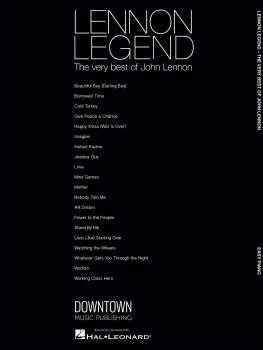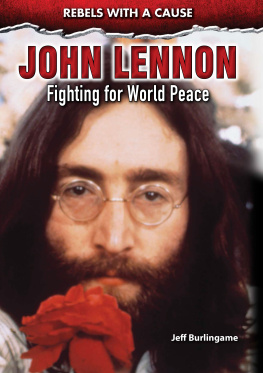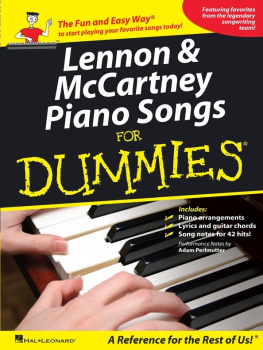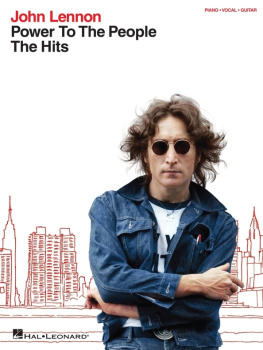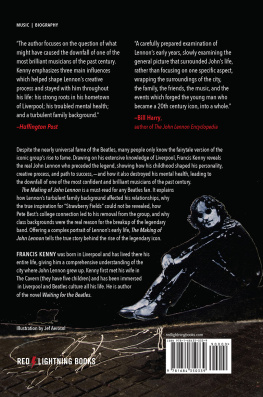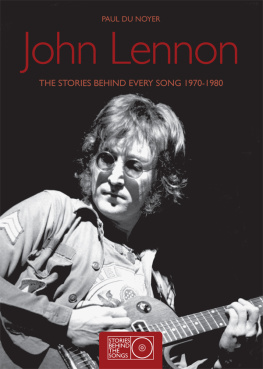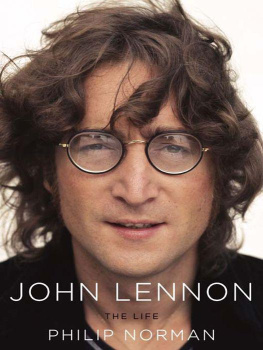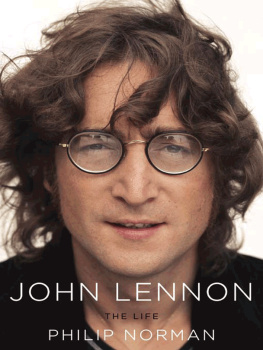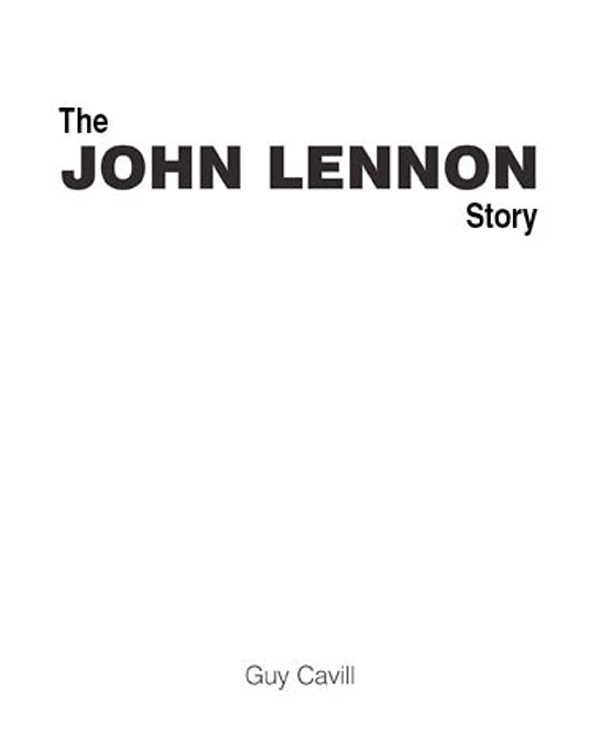Liverpool
On an autumn evening in Liverpool, a year after the outbreak of the Second World War, a young woman, Mary Mimi Smith, made her way through the darkened back streets of the city to the Liverpool Maternity Hospital in Oxford Street. The Germans had been carrying out air raids only a few days before, and on this particular night she was especially thankful that no bombs fell.* Mimi had only just phoned the hospital, learning that her sister Julia had given birth to a baby boy at 6:30pm, and she was excited to see her sister with her new son. At the hospital, holding the baby in her arms, she knew with complete certainty that this little boy would eventually be raised as her own.
It was 9th October 1940, and the child would later be named John Winston Lennon, after his paternal grandfather John Jack Lennon, and in a moment of patriotism, after Winston Churchill, the countrys recently elected prime minister. Johns father Alfred Alf as he was known was away at sea at the time of his sons birth. Though his work as a merchant seaman meant he was frequently away for long stretches of time, Julia was not left to fend for herself. She lived with her parents in a three-bedroom terrace house in Newcastle Road, close to Penny Lane, and both of them were of great assistance to her in looking after her new-born son.
Things continued in Newcastle Road for two years until Julia and John moved into a semi-detached cottage in Woolton Village that was owned by Mimi Smith and her husband George. The Smiths had offered her the house thinking that it might be a good idea for Julia to be closer to them, and perhaps to reclaim some of the independence shed sacrificed in moving in with their mother and father. But the two years they spent at the cottage were not happy ones, as Julia had taken to going out by herself now that she was away from the influence of her parents after all she needed something to alleviate the loneliness she was feeling: she rarely saw her husband, and when she did the tension was palpable.
*Mimi always insisted that there were air raids on the night of John Lennons birth, and as such this fact has made its way into most biographies written about him. However, recent research has uncovered that there were no raids on 9th October, though there were reports of 30 to 40 aircraft attacking the city on the 10th.
When Julias mother died in 1945, her father, finding that he couldnt bear to live in the house without his wife, moved in with some relatives. Julia jumped at the chance to return to Newcastle Road, and for a while things went smoothly. However, Julia started to feel lonely and cast adrift again. She often went out at night by herself, leaving John with a babysitter. And when Alf returned in early 1945, having not seen his son for over eighteen months, he was not prepared for the news that awaited him: Julia was pregnant.
Alf was quite gracious in offering to adopt Julias child, as Julia didnt want to marry the father, a Welsh soldier shed met by the name of Taffy Williams; but she was adamant that things wouldnt work between Alf and her. So, when Victoria was born, Julia gave her up for adoption. It was at this point that she met Bobby Dykins, with whom she later had two daughters: Julia and Jacqui. She never married Dykins (whom John nick-named Twitchy from the nervous tic he had) as she would not allow Alf the divorce he wanted. Dykins died tragically in 1966, the result of a car crash in Penny Lane.
Johns father Alf came back to Liverpool in January 1946, taking John with him to Blackpool a few days later. He knew a family there who were emigrating to New Zealand, and theyd asked him if he was interested in joining them, along with his son. Julia had found out where her husband was, and confronted him with what she knew he wanted to do. Alf felt cornered and asked John a question which would be pivotal to the childs life. He made the boy choose who he wanted to stay with. John chose his father, but when he saw how heartbroken his mother was he ran to her as she started to walk away. He called back to his father to join them but his father didnt come. It was twenty years later when they next met.
Though Julia obviously loved her son very much, she didnt feel that she could provide the security that her sister Mimi could offer him. So she reluctantly (but knowing it was for the best) handed John over to his aunt where he stayed for the rest of his childhood.
Aunt Mimi
Mimi and her husband George lived in a semi-detached house called Mendips on Menlove Road in part of a middle-class suburb of Liverpool (a far cry from the working-class life that John later said hed had). George had inherited with his brother the familys two dairy farms and would often work unsocial hours, but this didnt stop him spending considerable time with John, of whom he was very fond. He also exerted a great influence on the young Lennon, and encouraged him in many directions. He taught John how to read and draw and how to solve crossword puzzles. And it was George who bought him his first mouth organ, an instrument that was used by John many times on early Beatles recordings two decades later. George was only fifty-two when he died of a liver haemorrhage, and John was deeply affected by his death. He was buried in St. Peters churchyard, Woolton, as was another who achieved posthumous recognition: a certain Eleanor Rigby, who died almost a year to the day before John was born.
Julia would often visit John at Mimis house, finding that she was free to indulge her child as she no longer had the responsibility of his upkeep. She knew her sister disapproved of John playing music, but she bought a guitar for him, nevertheless (a Gallotone Champion), which he kept at her house. She also taught him the ukulele. John would go to his mothers whenever he wanted to hear music, and it was from her that he inherited his love of rock n roll. This was all very much against Mimis wishes, for Julia encouraged John to play all her records, particularly those by Elvis Presley, and they often enjoyed dancing around the kitchen together.
John And The Quarrymen
John began at Quarry Bank High School in 1952, after passing his eleven-plus exam (one of the few exams that John passed in his life). Though his early reports from the school were encouraging, his later ones were all but damning, with teachers stating that he was wasting everyones time, not least his own. In summation they felt that he would never amount to anything. Not exactly prescient, one thinks! In 1956 John formed the skiffle band The Quarrymen, named after a line in the school song. It was while in this group that one of the most famous meetings in music history occurred at St. Peters Church garden fte.
On 6th July 1957 The Quarrymen were asked to set up in the field behind the church and play a few songs. Paul McCartney happened to walk into this field while John was singing Come Go With Me. He was impressed by what he heard and was introduced to John in the scout hall afterwards. John in turn was impressed by Paul after he gave a rendition of Twenty Flight Rock, and after discussions with the others in the band later invited him into the group. Paul first performed with The Quarrymen on 18th October 1957 at a Conservative Club social held at the New Clubmoor Hall in Norris Green, Liverpool.
George Harrison made his entrance into the band through Paul, who knew him from The Liverpool Institute. At first John felt that George was too young he was only fourteen at the time but after Paul arranged for them all to meet on the upper deck of a bus with a guitar, John could see at first hand that the younger musician could play raunchy, as they termed it, and on this qualification was offered the role of lead guitarist for The Quarrymen.



